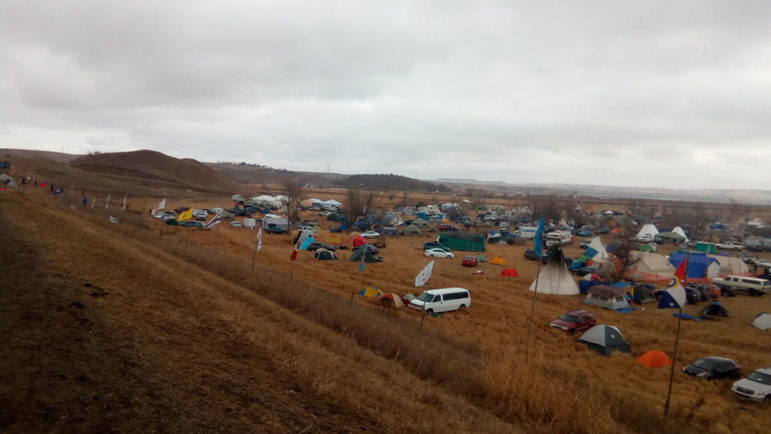
The historic gathering of Indigenous Nations and allies at Standing Rock Oceti Sakowin Camp had four agreements the Standing Rock Sioux Tribe and the Oceti Sakowin leaders asked those who joined them to observe. The prayerful message of the Water Protectors at the Oceti Sakowin Camp located on land managed by the U.S. Army Corps of Engineers was made to maintain diversity, community, volunteerism, and peaceful activism. They are shared here with NPQ’s readers because it occurs to us they are likely to be useful in many other settings.
We hope you will read them, think carefully about their meaning, and apply them in your work.
- Center the Indigenous
- Although people of all walks are welcome to join the movement, you must remember to follow indigenous leadership at all times. Decenter settler worldviews and recenter Indigenous practices and leadership. Ceremony and prayer are the bedrock of Indigenous peoples’ connection to land and water, so respect these traditions. Understand cultural appropriation and make every effort not to perpetuate this.
- Standing Rock challenges allies to be aware of their white privilege, and to occasionally be comfortable sitting in your own discomfort. Speak to understand, instead of speaking to be heard.
- Observe and follow: Don’t push your own ideas about what kinds of action should be taken; what is most radical, what the time frame should be. Indigenous leaders have been resisting settler colonialism for a long time and have good, culturally grounded reason for their decisions.
- Build a New Legacy
- Standing Rock aims to build a new legacy of peace for natives that can begin to heal damages from violence, colonization and historical persecution. Water is life; we are here to protect water, and to reinforce a legacy based on the wisdom of the elders and a culture built on prayer and ceremony.
- Be Useful
- Although most people come to Standing Rock expecting to be active in protests, there are endless ways you can volunteer around camp. One huge need right now is winterization as winter is approaching quickly in North Dakota. Volunteers can also help out in the kitchen serving and preparing meals, helping to organize donations which are constantly coming in, offering your vehicle to go on supplies runs, or just walking around and picking up garbage could be a great way to help keep the camp clean. Make sure you are contributing and offering resources in any way you can, from tangible items like firewood and water to physical labor.
- Bring It Home
- Do you know whose land you currently live on? Take the time to research if there are Indigenous populations still in your area, if they have been relocated, and how you can help protect them.
- Work for repatriations of land, upholding treaties, and funding Indigenous-led struggles and efforts for land return. This entails supporting Standing Rock, and other Indigenous led struggles in your region, building power to force the state to respect treaties, and going creative fundraising campaign such as door knocking for reparations as member of Resource Generation did in the Bay Area in solidarity with POOR Magazine’s “Stolen Land and Hoarded Resources Tour.”
These four principles founded at Standing Rock should serve as an example for how nonprofits can address and ensure that we are placing diversity and inclusion first.
The Army Corps of Engineers announced on Monday that it would not be granting the final permit needed for the pipeline construction and would look for an alternative route, considered quite a victory for Standing Rock’s water protectors even though the new route has yet to be determined.
Winter has hit North Dakota with brutal force, so Standing Rock Sioux Tribal Chairman Dave Archambault II released this letter urging both celebration and vigilance and reminding participants to value what is important in the work:
I know we have prayed and continue to do so. Now you must believe in your prayer.
Sign up for our free newsletters
Subscribe to NPQ's newsletters to have our top stories delivered directly to your inbox.
By signing up, you agree to our privacy policy and terms of use, and to receive messages from NPQ and our partners.
Energy Transfer Partners cannot cross the easement, even if they drill. Not only will they will jeopardize the entire pipeline project, but they will also jeopardize their investors’ money and their bank loans. They may drill up to the federal lands to try to provoke the campers. They will do this to create the illusion that the Army Corps of Engineers made the wrong decision. We do not need to engage them in this; we need to go home. While this phase of the struggle relied largely on the protectors at camp, this next stage will be focused on the legal battles, and keeping the current decision in place.
A new administration will not easily be able to reverse Sunday’s historic decision. This decision is everything we had asked for: a non-granting of the easement, initiating an Environmental Impact Study, and suggestive of a reroute. We got it! Energy Transfer Partners will face an uphill battle in trying to dismantle the process initiated by this decision.
We deeply appreciate all the people who supported us with their presence, but when this storm passes, it is time to dismantle the camp and return to our homes. If the camp stays where it is currently located, people are risking their lives. The current weather is severe, making travel impossible. If the camp stays, we run a risk of further provocation from local law enforcement. Once one person is hurt or property is destroyed, that will lead to more outsized actions by law enforcement. The longer the camp stays, the greater risk we run of seeing further violence at the hands of law enforcement and potential injury to our supporters.
Our great leaders of the past would never put the people at risk of harm, especially women and children. I don’t want anyone to be living in an unsafe environment. We need to stay in prayer, believe in our prayer, and begin our journey home in prayer. I believe in my prayers and in the Creator. Take the lessons we learned here and apply them at home—unity, peace, prayer.
I know this is a victory for this one DAPL battle, but we have not yet won the DAPL war. There will be more battles ahead and we will continue to strategize and win. The camp has brought us this far—now it is time we pivot to the next phase of this struggle. That will be lead on different fronts like in court, with the new Administration, with Congress, and with the investors.
We are establishing a path now to help the world understand that what we asked for and what we got is the right decision. The world is watching us and our behavior will determine the final outcome.












